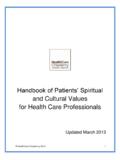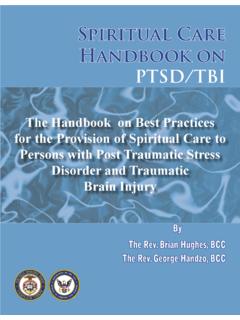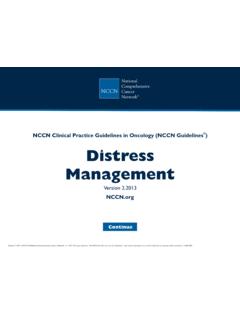Transcription of Professional Chaplaincy: Its Role and Importance in Healthcare
1 A White Paper Professional chaplaincy : Its Role and Importance in Healthcare Editors: Larry VandeCreek Laurel Burton @TheAssociation of Professional Chaplains @TheAssociation for Clinical Pastoral Education OThe Canadian Association for Pastoral Practice and Education @TheNational Association of Catholic Chaplains @TheNational Association of Jewish Chaplains This project was funded by a grant from the Bristol-Myers Squibb Foundation. Summary This paper describes the role and significance of spiritual care and is the firstjoint statement on this subject prepared by the five largest health- care chaplaincy organizations in North America representing over 10,000. members. As a consensus paper, it presents the perspectives of these bod- ies on the spiritual care they provide for the benefit of individuals, health- care organizations and communities.
2 Throughout this paper, the word spirituality is inclusive of religion; spir- itual care includes pastoral care. Spiritual caregivers in Healthcare institu- tions are often known as chaplains although they may have different designations in some settings, spiritual care providers. The paper con- tains four sections. 1. The Meaning and Practice o f Spiritual Care This first section describes spirit as a natural dimension of all persons and defines the nature of spiritual care. With the basic premise that attention to spirituality is intrinsic to Healthcare , the paper establishes their relationship and outlines the various environments in which it is provided. 2. Who Provides Spiritual Care? Professional chaplains provide spiritual care and this section describes their education, skills and certification.
3 3. The Functions and Activities o f Professional Chaplains This section delineates the typical activities of Professional chaplains within Healthcare settings, focusing on their care of persons and their participation in Healthcare teams. 4. The Benefits o f Spiritual Care Provided by Professional Chaplains The materials here describe how Professional chaplains benefit health- care patients and their families, staff members, employing organiza- tions, and communities. The Journal of Pastoral Care, Spring 2001, Vob 55, No. 1. 81. The Joint Commission on the Accreditation of Healthcare Organiza- tions (JCAHO, 1998) in the states, "Patients have a fundamental right to considerate care that safeguards their personal dignity and respects their cultural, psychosocial, and spiritual values.
4 " A Canadian accreditation agency makes similar statements. Such regulations, and efforts to meet them, flow from the belief that attention to the human spirit, including mind, heart and soul, contribute to the goals of health- care organizations. Section I: The Meaning and Practice of Spiritual Care Spirit is a natural dimension of every person. Reflecting on the ancient word Spirt, May (1982) writes, "Spirit implies energy and power." The word Spirituality goes further and describes an awareness of relationships with all creation, an appreciation of presence and purpose that includes a sense of meaning. Though not true generations ago, a distinction is fre- quently made today between spirituality and religion, the latter focusing on defined structures, rituals and doctrines.
5 While religion and medicine were virtually inseparable for thousands of years, the advent of science created a chasm between the two. The term spirituality is a contemporary bridge that renews this relationship. In this paper, the word spirituality includes religion; spiritual care is inclusive of pastoral care. Those who pro- vide spiritual care in Healthcare settings are often known as chaplains although in some settings they may be described as spiritual care providers. Spirituality demonstrates that persons are not merely physical bodies that require mechanical care. Persons find that their spirituality helps them maintain health, cope with illnesses, traumas, losses, and life transi- tions by integrating body, mind and spirit. When facing a crisis, persons often turn to their spirituality as a means of coping (Pargament, 1997).
6 Many believe in its capacity to aid in the recovery from disease (McNichol, 1996) and 82 percent of Americans believe in the healing power of per- sonal prayer (Kaplan, 1996). using it or other spiritual practices during ill- ness. Persons frequently attend to spiritual concerns within religious com- munities through the use of traditional religious practices, beliefs, and values that reflect the cumulative traditions of their religious faith. They may pray, read sacred texts, and observe individual or corporate rituals that are particular to their tradition. Religious beliefs may encourage or forbid certain behaviors that impact Healthcare . Others focus their spirituality outside traditional religious communi- ties and practices. All, however, share deep existential needs and con- cerns.
7 Many persons both inside and outside traditional religious structures, report profound experiences of transcendence, wonder, awe, joy, and connection to nature, self, and others, as they strive to make their lives meaningful and to maintain hope when illness strikes. Support for their efforts is appropriately thought of as spiritual care because their search leads to spiritual questions such as Why do I exist? Why am I ill? Will 1 die? and What will happen to me when I die? Institutions that ignore the spiritual dimension in their mission statement or daily provi- sion of care increase their risk of becoming only "biological garages where dysfunctional human parts are repaired or replaced" (Gibbons &. Miller, 1989). Such "prisons of technical mercy" (Berry, 1994) obscure the integrity and scope of persons.
8 Spiritual Care: Its Relationship to Healthcare 1. Healthcare organizations are obligated to respond to spiritual needs because patients have a right to such services. Regulatory and accrediting bodies require sensitive attention to spiri- tual needs. As the Joint Commission on the Accreditation of Healthcare Organizations UCAHO, 1998) makes clear, "Patients have a fundamental right to considerate care that safeguards their personal dignity and respects their cultural, psychosocial, and spiritual values." The Canadian Council on Health Services Accreditation (1999) states, "When develop- ing the service plan, the team considers the client's physical, mental, spir- itual, and emotional needs. The team respects the clients' cultural and religious beliefs and enables them to carry out their usual cultural or reli- gious practices as appropriate.
9 " In an effort to fulfill such mandates as well as honor their own values, Healthcare institutions create 'patient rights' statements in which they pledge to provide sensitive attention to the dignity, culture, beliefs, practices, and spiritual needs of all patients, their caregivers, and hospital personnel. Such attention flows from the belief that care of the body alone cannot be effective if the mind, heart, and soul are ignored. Healthcare professionals increasingly recognize that patients want holistic approaches to their well-being. For several years, Harvard cardi- ologist Herbert Benson, has conducted popular biannual educational events for Healthcare professionals that explore spirituality and healing in medicine. Following intensive research, he (1999) wrote, "I am aston- ished that my scientific studies have so conclusively shown that our bod- ies are wired to (be) nourished and healed by prayer and other exercises of belief.
10 " Professional chaplains respect and respond to patient values and beliefs, encouraging a more holistic approach to Healthcare . 2. Fear and loneliness experienced during serious illness generate spiritual crises that require spiritual care. While it is a biological event, serious illness frightens patients and iso- lates them from their support communities when they need them most. Losses such as physical and cognitive capacities, independence, work or family status, and emotional equilibrium, along with the accompanying grief, can seriously impact their sense of meaning, purpose, and person- al worth. Professional chaplains address these crises through spiritual care that emphasizes transcendence and enhances connections to support com- munities, thus aiding healing and recovery.












